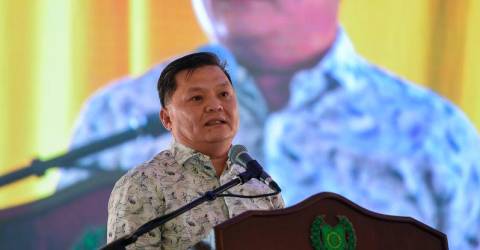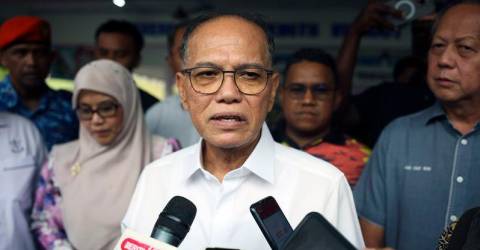ADVERTISE HERE
KUALA LUMPUR: While global leaders and environmentalists are convening in Dubai, United Arab Emirates (UAE), to grapple with the pressing challenges of climate change at the ongoing United Nations (UN) climate talks, waste management expert Soon Hun Yang is taking a different route.
Rather than participating in the 28th Conference of the Parties of the United Nations Framework Convention on Climate Change (COP28), he is trying to unearth innovative solutions to curb methane emissions from palm oil mills.
The chief executive officer of Eco-Ideal Consulting Sdn Bhd, a Malaysia-based environmental consultancy, recently shared a selfie in front of a palm oil mill in Sarawak after leading his team on a mission to the state to identify methane emissions from the industry concerned.
“While all those leaders are discussing how to ‘delay’ climate actions, my team is on the ground looking at reducing methane emissions from oil palm plantations.
“Challenging case to justify this particular investment and some climate finance would be helpful here (if methane emissions are taken into account),“ he said in his post on his LinkedIn profile recently.
Methane is a greenhouse gas (GHG) and the second-most powerful climate pollutant (after carbon dioxide or CO2).) with 60 percent of its emissions caused by human activities. The chief contributors are the oil and gas (energy), palm oil (wastewater) and solid waste sectors.
Soon told Bernama although Malaysia signed the Global Methane Pledge (GMP) during COP26 in Glasgow, Scotland, in November 2021, so far “we haven’t heard anything from the government on their efforts to reduce methane emissions, even during COP28 which is happening right now”.
The GMP, launched by the United States and the European Union, aims to catalyse action to reduce global methane emissions, with the signatories committing to collectively reduce methane emissions by at least 30 percent below 2020 levels by 2030.
As of November 2022, more than 150 countries have signed the pledge.
According to Malaysia’s third biennial update report to the UN, methane emissions contributed to 17 percent of GHG emissions in 2016, with its major source being fugitive emissions from the oil and gas industry.
‘Low-hanging fruit’
Several local scientists and experts Bernama spoke to agreed that since the signing of the GMP two years ago, the implications for action on methane emissions in Malaysia “remain unclear without any demonstrable government initiative focusing on coordinated methane action”.
In Malaysia’s context, according to them, it is a ‘low-hanging fruit’ when it comes to addressing climate change because routine maintenance can plug industry methane leaks while solutions to addressing methane emissions are not only cost-effective but also faster and cheaper than other climate mitigation options such as reducing livestock farming.
Environmental Defense Fund (EDF) Global Energy Transition director Dr Shareen Yawanarajah said for the longest time, methane was not part of the climate conversation, which has always been associated with mitigating CO2 emissions.
She said methane emissions account for roughly 25 percent of current global warming and it traps 80 times more heat than CO2 over 20 years, and the oil and gas industry is a leading contributor.
“A lot of emission reductions (in most countries) are currently being undertaken voluntarily, except for the US, Canada and Mexico which have their methane regulations. Most of the oil and gas countries don’t have any sort of policy or regulatory framework in place that would make it mandatory (to regulate methane emissions).
“At EDF, we believe the industry should and must play a role in terms of solving this problem but we need a robust regulatory foundation,“ she told Bernama in an interview recently.
She said to increase methane expertise, EDF has formed partnerships with climate scientists from public and private universities in Malaysia, namely Universiti Malaya (UM), Universiti Kebangsaan Malaysia, Swinburne University Kuching and University of Nottingham Malaysia. As part of their collaboration, a 54-page book titled ‘Global Methane Pledge: A Review of Data, Policy and Transparency in Reducing Methane Emissions in Malaysia’ has been published. It presents an investigation of methane emission governance processes among key government agencies and corporations and was published in September this year by ISEAS Yusof Ishak Institute.
Shareen, who is among seven experts who co-authored the publication, said EDF’s support of researchers in Malaysia provides “essential data” for well-informed decision-making on methane management strategies through data gathering, mitigation technology analysis and cost computation.
Methane satellite
She said EDF has been working on scientific efforts to bring the world’s attention to the importance of reducing methane emissions and their research showed concerted global action using existing technologies can slow the rate of global warming by as much as 30 percent by 2030.
“There are already tools in place to measure methane emissions, (and in fact) EDF will launch a satellite, hopefully in the first quarter of next year, called ‘MethaneSAT’ which carries sensors that are designed to accurately measure methane emissions from across the globe.
“The satellite, which will circle the globe 15 times a day, can identify not just how big the problem is but accurately locate where emissions are coming from.
“That data will be made available publicly in a data platform we have developed, and it will help regulators, companies as well as the public to work together to reduce methane emissions,“ she explained.
Data
Head of the School of Environmental and Geographical Science at the University of Nottingham Malaysia Associate Prof Dr Matthew Ashfold said according to Malaysia’s Biennial Update Report (BUR4), the key sectors that emit methane gases in Malaysia are oil and gas (35 percent), palm oil via wastewater mill effluent (29 percent) and solid waste (23 percent).
He said currently, several datasets provide information about Malaysia’s methane emissions; however, uncertainties remain as the different datasets show inconsistent emissions values.
For instance, in terms of methane emissions from Malaysia’s oil and gas sector, the latest government data attributed 57 percent of the emissions to venting from oil production and reports no emissions from venting from gas production; the International Energy Agency data, meanwhile, indicates that venting from oil and gas productions contributed 27 percent each.
“Our findings show more scientific studies based on measurements of methane in the atmosphere need to be carried out and more attention is required in improving the quantification of methane emissions,“ pointed out Ashfold.
“We need better data for stronger action to reduce methane emissions. Poor understanding of true levels of methane emissions and the underlying distribution of sources are among the factors that can hamper methane mitigation.”
He suggested that the measurement, reporting and verification (MRV) approach be used as an important tool to improve confidence in methane emission data. MRV refers to the multistep process of measuring the amount of GHG emissions from a specific source reporting these emissions and having the reports subjected to independent verification.
Public perspective
Deputy dean (Research) of the Faculty of Arts and Social Sciences at UM Associate Prof Dr Helena Varkkey, who is one of the authors of ‘Global Methane Pledge: A Review of Data, Policy and Transparency in Reducing Methane Emissions in Malaysia’, said it assesses the status and prospects for action on methane emissions in Malaysia through literature review, public survey and focus group discussions.
She said their findings from a national survey conducted earlier this year showed “generally low awareness” among the public of methane’s potency as a GHG.
“More than half of our respondents (58 percent) were unaware of methane in the context of climate change. Electricity generation was incorrectly thought to emit more methane in comparison to the leaks occurring along the oil and gas supply chain,“ she said, adding Malaysia can do more to demonstrably fulfill the commitments associated with the signing of the GMP in 2021.
Helena said the government must clearly articulate a national direction for methane action while corporations must improve the quantification and transparency of methane emissions.
“To increase public concern towards the GMP goals, civil society organisations should highlight the strong air quality and health co-benefits arising from methane action,” she added.
During a summit on methane and non-CO2 greenhouse gases in Dubai last Saturday, which was the third day of COP28, its host UAE called on parties to the Paris Agreement signed in 2015 to submit national climate targets for 2035 that are economy-wide and cover all GHGs, not just CO2 – echoing a recent commitment made by the US and China under a new bilateral climate deal.
Helena said although no specific day was allocated to focus on methane during COP28, “there will be conversations about the second-largest GHG during the events held on the sidelines of the climate summit.
“What Malaysia (delegation) can do in terms of methane... I think there is still a lot of work to do to highlight the importance of methane among policymakers to the extent that this will be among our key issues to bring to the COP,” she said.–Bernama

 1 year ago
181
1 year ago
181



 English (US) ·
English (US) ·